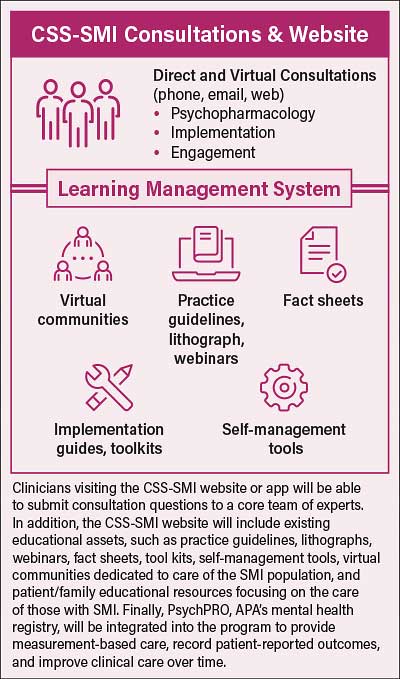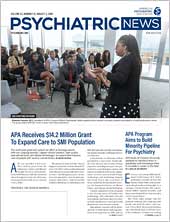APA was awarded a five-year, $14.2 million grant from the Substance Abuse and Mental Health Services Administration (SAMHSA) to establish a national clinical support center for clinicians treating patients with severe mental illness (SMI).
The program, known as the Clinical Support System for Serious Mental Illness (CSS-SMI), will use education and consultation to expand the base of clinicians—including physicians, nurses, recovery specialists, peer-to-peer specialists, and others—able to provide evidence-based care to individuals with SMI. SMI typically includes schizophrenia, bipolar disorder, and major depressive disorder.
Consultations to clinicians will be provided by a “core team” of individuals with clinical and systems-change expertise, including two part-time psychiatrists, a psychologist, a nurse, and experts in patient and family engagement, recovery, instructional design, technology, and marketing. Experts hail from UCLA, the University of Texas, Stanford, Mental Health America, the National Alliance on Mental Illness, and Charge Ahead Marketing.
A major component of the program is the incorporation of health care technology. APA will build web and smartphone platforms that will allow virtual consultations with experts and disseminate educational content.
Educational content will be developed by 15 individuals and organizations with expertise in SMI, and an advisory board will include broad representation from across the mental health community and include patients and family members. In total, 30 organizations are part of this initiative.
APA Deputy Medical Director Tristan Gorrindo, M.D., and the Division of Education will lead the initiative for APA in collaboration with the Division of Policy, Programs, and Partnerships.
“This effort leverages assets that APA can uniquely provide—expert clinical wisdom, the highest-quality educational tools, and cutting-edge digital technology—to achieve goals to which APA is committed, namely improving the care of the seriously mentally ill,” Gorrindo told Psychiatric News. “It’s a multi-year effort involving a lot of moving parts, but its goal is to significantly improve access to care for the millions of individuals with schizophrenia, bipolar disorder, and major depression who are not currently receiving adequate treatment.”
Here’s how the system will work:
Visiting the CSS-SMI website or app, clinicians will be able to submit consultation questions to the core team of experts. An automated “answer engine” driven by items already in the CSS-SMI education library will attempt to answer the question automatically. If the question is not answered by the answer engine, it will be referred to one of the members of the core CSS-SMI team for a direct response. The direct response will be sent via email, and responses will be added to the answer engine for future questions that are similar in nature. In this manner, the CSS-SMI website is a self-learning platform that will become more efficient in answering consultation questions as time goes on.
In addition, the CSS-SMI website will include existing educational assets, such as practice guidelines, lithographs, webinars, fact sheets, tool kits, self-management tools, virtual communities dedicated to care of the SMI population, and patient/family educational resources focusing on the care of those with SMI. Content experts will develop a national curriculum within the system on assisted outpatient treatment and a Clozapine Center of Excellence.
The CSS-SMI team will use a number of outreach efforts to make clinicians aware of this resource, including the use of Google ads, social media, and Google analytics. This effort will supplement outreach by APA at its Annual Meeting and through its own communication venues, including Psychiatric News. The clinical expertise team will also identify “communities of highest need” and work directly with them in the implementation of evidence-based treatment. Additionally, PsychPRO, APA’s mental health registry, will be integrated into the program to provide measurement-based care, record patient-reported outcomes, and improve clinical care over time. If a clinician in PsychPRO is shown to need improvement in this area, he or she will automatically receive electronically suggested educational resources.
Once fully launched, the CSS-SMI initiative anticipates 150,000 website visits a year and 26,450 consults and/or educational interactions per year.
“This is a truly innovative and groundbreaking project, that will extend APA’s expertise to fill gaps in care for people with serious mental illness,” said APA CEO and Medical Director Saul Levin, M.D., M.P.A. “This project will bring customized, evidence-based information to those caring for patients with SMI using state-of-the-art technology.”
APA President Altha Stewart, M.D., said CSS-SMI is an example of APA’s commitment to serving the most seriously mentally ill. “We are grateful to SAMHSA for funding this initiative and for recognizing the need for creative solutions to meet the treatment needs of our patients with schizophrenia, bipolar disorder, and major depressive disorder—especially multiracial/multi-ethnic individuals, non-Hispanic whites, women, sexual minorities, and young adults with serious mental illness.” ■

